Interview with The Whispered World Designer Marco Hüllen
Note: This is Day 3 of “The Whispered World Week” at The Slowdown. Check back for more tomorrow!
In today’s interview, we talk to the original designer and primary illustrator of The Whispered World, Marco Hüllen (on the right), in the hopes of shedding more light on the curiouser details of the development process of the game – especially, on details that are still left uncertain for non-German audiences.
After all, German fans of the adventure game have had the privilege of reading Marco’s posts on various adventure gaming forums – as well as having already played the game. For those of us not yet in the know, the interview below should hopefully reveal some further facets of the make-up of the wildly imaginative ride that is the six-year development process of the game.
Finally, please do remember to take a look at our introductory post to The Whispered World – the article, written in conjunction with this interview, details the game’s history from inception to conception, between the years 2004 and 2010, and should by all means get you better prepared for the game’s release on the 23rd.
A special thank you goes to the very genial mister Hüllen, who braved our questions despite a minor language barrier. Therefore, the interview has been translated, from German into English, by Martyn Zachary and Richard Scary for The Slowdown. The original answers, in the German language, will also be published on the website later.
The Slowdown: After having worked so long on a project that began way back in the first half of the 00’s as an university project, are you feeling any fatigue now that the game is finally coming out?
Marco Hüllen: A little, but the joys do outweigh the fatigue. When I first started work on the game, I never expected it to become such a marathon for me. Much has been enjoyable, and a lot was equally frustrating. In the end it all came together nevertheless, and with that in mind it has all been worthwhile.


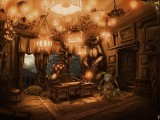 How long have you been working on the game, exactly?
How long have you been working on the game, exactly?
Oh, it has already been quite a few years: I started work in the year 2004, with The Whispered World as the topic of my diploma thesis. When I completed my degree in late 2005, I made the decision to develop the game further at Bad Brain Entertainment, for whom I had done graphics on some other titles during my studies.
Unfortunately, the company went bankrupt after about six months and I did no further work on the game. After that I became lead artist at Independent Arts Software, where I worked on games for the Nintendo DS and Wii. In 2007, I came in contact with Daedalic Entertainment by chance, who then inquired if I would continue to work on the game at the studio. Thus my work at Daedalic began in September 2007, where I worked on the game, together with the rest of my colleagues, for almost 2 years as lead artist and game designer, up until its release in Germany in August 2009.
Was your graduation project more a visual arts or a game design project?
I did graphic design and illustration at the Rhein-Sieg academy of arts. Though my diploma thesis focused more on illustration and advertising than on game design, I nevertheless wanted to put on display as much actual game as possible, and developed a story, a trailer and a demo for the game in which important features of the game’s design, like Spot, some puzzles and characters were shown.
There is some mystery as it relates to the original playable demo you released for the game back in 2005. How close was the game to a full release at that time?
The demo was part of my dissertation and really just a snippet from the game. Since I did the demo completely alone it only had 4-5 rooms, but did already contain basic animations for the main characters, Sadwick and Spot. In contrast, the game now contains 60 rooms, many people have worked to improve the game and the character of Sadwick underwent a complete redesign.
How does the 2007 German-only trailer figure in all this, then? What was its function? Did you design the trailer all by yourself, as a marketing vehicle, for instance? It still contains the previous version of Sadwick, and borrows music (“Ano natsu he”) from Miyazaki’s renown anime, Spirited Away – do I see a Studio Ghibli influence there?
The trailer was, like the demo, part of my thesis and was not meant for public consumption, as it contained music from the film Spirited Away. Miyazaki’s films have been a great inspiration to me and the music was only meant to illustrate where the direction of the music and the atmosphere of the game should go.
We’ve come to understand that Bad Brain’s Wolfgang Kierdorf effectively owned, at one time, the licensing rights and the characters of The Whispered World. How did that come to happen, and how did Daedalic eventually get the license?
Bad Brain never did have the rights to the game: Only the portion of graphics and content that was created during my stay at the company belonged to them. Around the same time, the game’s story capsized completely, and really had hardly anything to do with my original vision. It wasn’t until Daedalic that my story was picked back up.
Daedalic then bought the existing parts from Bad Brain, and came to an agreement with me in regards to my rights to the game.
From what I understand, your relationship with Bad Brain Entertainment was never quite as poor as reported in the English-speaking press. For one, the contractual issues you had with them seem to have been overstated. In your opinion, does Bad Brain’s legendary bad reputation relate more to their high-profile issues with Autumn Moon and Bill Tiller?
While there were indeed many problems within the company, I’m very reluctant to talk ill of Mr. Kierdorf, who was essentially a great boss. I have never interfered in regards to his failings in successfully delivering on his promises with A Vampyre Story, and have only learned about the problems via the gaming press. It does seem that something went wrong there.
In retrospect, how would you characterize Mr. Kierdorf, who is often demonized and vilified among adventure game fans?
Ultimately, Kierdorf is just someone who enjoyed the adventure game genre as much as I did, and he had huge plans for huge games. Unfortunately, nothing ever became of it in the end, as we all know.
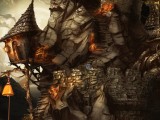
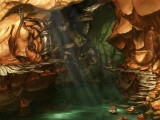
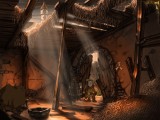 The absolute worst period during the development of The Whispered World?
The absolute worst period during the development of The Whispered World?
When management of the game at Bad Brain completely changed and I was no longer able to see much of what I had once planned. I believe it’s good that that the game was not brought to completion at the time.
As the game’s credits roll, you are quite strikingly credited for a vast amount of different tasks and developmental roles; How large a percentage do you estimate your final contribution to the released version to be?
Most of my work was done with the backgrounds, which are largerly mine, and also the characters, which I have created myself with a few exceptions. Apart from that, I designed the entire interface, many items and some animations, like the running animations for Sadwick and Spot. Most of the other animations have been done by my colleagues at Daedalic, who have all done a great job.
Above all, I would like to praise Simone Kesterton and Gunnar Bergmann especially. There was a summary of my story that I had already done during my thesis, and together with Sebastian Schmidt and Jan Müller Michaelis Spitzname, we worked it out further.
I was also involved in game design as well as one or two 3D effects.
Claas Paletta’s FAQ for The Whispered World lists further influences than just the aforementioned Miyazaki: Classic fairy tales and adventure games like Monkey Island. Would you agree with these? Any other influences you had back when you first started work on the game?
Yes, Miyazaki was indeed the biggest inspiration for the game, but other fantasy films from my childhood, such as The Last Unicorn, or Labyrinth, had a great influence on me as well. The game even contains elements of the movie Fight Club, which inspired some of the plot twists.
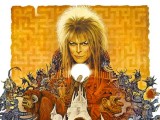
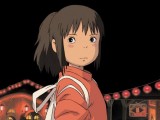
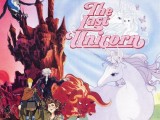 What has most recently motivated you as an artist? A film, a work of art, an album?
What has most recently motivated you as an artist? A film, a work of art, an album?
I am an enormous film buff, and love stories with oddball characters; Jean-Pierre Jeunet’s Amelie, as well as the wonderful music of Yann Tiersen, have inspired my newest hobby project, Limbus. For me, music is one of the most important things in being able to dive into a new, different world.
If I’m painting a picture or two, I tend to listen to the same music again and again – I know that might sound crazy to some, but it really helps me to convey the atmosphere I’m trying to imbue the images with.
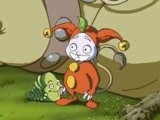 Sadwick the clown, then. How did the transformation from the old Sadwick (on the left) over to the new design happen? The previous iteration appears to me more child-like and innocent, unprepared, with the colour red ultimately striking a parallel more towards children’s entertainment.
Sadwick the clown, then. How did the transformation from the old Sadwick (on the left) over to the new design happen? The previous iteration appears to me more child-like and innocent, unprepared, with the colour red ultimately striking a parallel more towards children’s entertainment.
And what became of his tail?
We wanted to develop a look that would appeal to an older audience, and subsequently a character with which we could express more emotion, which was immensely important for the game. His lion’s tail, from that time, became a casualty in the process.
The character of Sadwick, in some ways, exudes the bitter-sweet melancholy of Charlie Chaplin’s The Tramp in his 1928 silent film, The Circus. How did you arrive upon the character of the clown?
What I’m referring to here is the cruel existential position of the circus performer; the showmen and -women of the circus are also perpetually outside society, bound to their work and travel. Is Wanderlust the source of Sadwick’s melancholy?
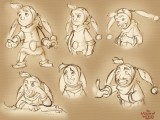 Sadwick the character was meant to be very unsatisfied with his current life, completely ready to break free of its constraints. We often have to hide our true feelings in life, like feign happiness just to make other people happy, even though what we’re feeling might be the complete opposite of that. We all have surely smiled to a loved one in mourning even though we were full of grief ourselves.
Sadwick the character was meant to be very unsatisfied with his current life, completely ready to break free of its constraints. We often have to hide our true feelings in life, like feign happiness just to make other people happy, even though what we’re feeling might be the complete opposite of that. We all have surely smiled to a loved one in mourning even though we were full of grief ourselves.
Thus, a clown that is unhappy with his own life seemed to me to have fine contrast that would then distinguish Sadwick from other characters in adventure games, and breathe enough life into him, to make him sympathetic and tell an emotional story in a world that is just as fragile as Sadwick is. I hope the players will empathize with Sadwick enough, so that they can laugh with him at the end of the game but also feel a hint of sadness.
This all begs the question: How closely does The Whispered World of today resemble your original vision of the game?
Apart from a few exceptions, the game became what I had wished for. Though surely one’s never 100% satisfied – that would be a crying shame, after all, since you should always try to better yourself.
Now that the game is nearly ready and published, did it originally ever cross your mind that the game’s development could become such a wild ride?
Never ever!
A do-or-die question, a high-priority issue the ambiguity of which is torturing non-German players all around the globe. Which is it, yes, which is it – is Spot a worm or a caterpillar?
A caterpillar, with a few special abilities to boot.
Finally, now that the game is finished and released, are you going to be working on other projects with Daedalic?
I work as a concept artist at Related Designs at the moment. But you never know.
At this point, I would like to take the time, once again, to thank Marco for his answers, hopefully we all now have a better idea of what went down behind the scenes. Here’s to hoping that The Whispered World is not the last of Marco’s fantastic graphic design on adventure games.
For Hüllen’s personal website, check out Fantastic Creatures; The Whispered World’s official website can be found here. The game is out in the UK, Scandinavia, Spain and Italy on April 23, 2010, and on the 26th in North America. Though no timeframe is yet given, Daedalic also promise a release on Steam and other digital download platforms.
Jan Müller Michaelis Spitzname. Er ist der Creative Director von Daedalic. </img>
</img>
</img>
</img>
</img>




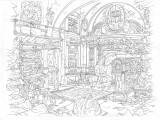
2 Comments
Recommended Comments